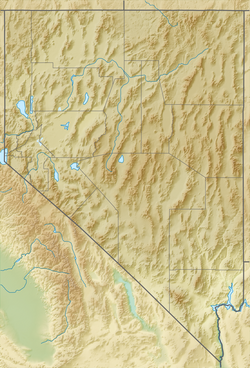Gabbs Formation
| Gabbs Formation | |
|---|---|
| Stratigraphic range: Norian-Hettangian ~ | |
| Type | Formation |
| Unit of | Volcano Peak Group |
| Sub-units | Nun Mine, Mount Hyatt & Muller Canyon Members |
| Underlies | Sunrise Formation |
| Overlies | Luning Formation |
| Lithology | |
| Primary | Siltstone, limestone |
| Other | Mudstone |
| Location | |
| Coordinates | 38°30′N 118°06′W / 38.5°N 118.1°W |
| Approximate paleocoordinates | 18°06′N 55°42′W / 18.1°N 55.7°W |
| Region | Nevada |
| Country | |
| Type section | |
| Named for | Gabbs Valley Range |
| Named by | Muller & Ferguson |
| Year defined | 1939 |
The Gabbs Formation is a geologic formation in Nevada. It preserves fossils dating back to the Late Triassic and Early Jurassic periods, and is one of the few formations in the United States known to include the Triassic-Jurassic boundary.[1][2][3][4] In 2007, an exposure of the Gabbs Formation at New York Canyon was proposed a candidate GSSP for the Hettangian stage, the first stage of the Jurassic.[5] However, the New York Canyon section was ultimately not selected as Hettangian GSSP, which instead went to the Kuhjoch section (Kendlbach Formation) of Austria in 2010.[6]
Fossil content
[edit]The Gabbs Formation hosts several diverse assemblages of ammonites, bivalves, and other invertebrates.[1] In 2021, several ammonites were newly described from the formation:[7]
- Arcestes lawsi
- Paracochloceras nunminensis
- Peripleurites gabbensis
- Placites heggi
- Rhacophyllites mulleri
- R. volcanoensis
See also
[edit]References
[edit]- ^ a b Laws, Richard A. (1982-03-01). "Late Triassic depositional environments and molluscan associations from west-central Nevada". Palaeogeography, Palaeoclimatology, Palaeoecology. 37 (2): 131–148. Bibcode:1982PPP....37..131L. doi:10.1016/0031-0182(82)90036-0. ISSN 0031-0182.
- ^ Taylor, David G.; Smith, Paul L.; Laws, Richard A.; Guex, Jean (October 1983). "The stratigraphy and biofacies trends of the Lower Mesozoic Gabbs and Sunrise formations, west-central Nevada". Canadian Journal of Earth Sciences. 20 (10): 1598–1608. Bibcode:1983CaJES..20.1598T. doi:10.1139/e83-149.
- ^ Hallam, A.; Wignall, P. B. (2000-01-01). "Facies changes across the Triassic–Jurassic boundary in Nevada, USA". Journal of the Geological Society. 157 (1): 49–54. Bibcode:2000JGSoc.157...49H. doi:10.1144/jgs.157.1.49. ISSN 0016-7649. S2CID 131484322.
- ^ Ward, Peter D.; Garrison, Geoff H.; Williford, Ken H.; Kring, David A.; Goodwin, David; Beattie, Michael J.; McRoberts, Christopher A. (2007-02-09). "The organic carbon isotopic and paleontological record across the Triassic–Jurassic boundary at the candidate GSSP section at Ferguson Hill, Muller Canyon, Nevada, USA" (PDF). Palaeogeography, Palaeoclimatology, Palaeoecology. Triassic-Jurassic Boundary events: problems, progress, possibilities. 244 (1): 281–289. Bibcode:2007PPP...244..281W. doi:10.1016/j.palaeo.2006.06.042. ISSN 0031-0182.
- ^ McRoberts, Christopher A.; Ward, Peter D.; Hesselbo, Stephen (July 2007). "A proposal for the base Hettangian Stage (= base Jurassic System) GSSP at New York Canyon (Nevada, USA) using carbon isotopes". International Subcommission on Jurassic Stratigraphy. 34 (1): 43–39.
- ^ Hillebrandt, A.v.; Krystyn, L.; Kürschner, W.M.; Bonis, N.R.; Ruhl, M.; Richoz, S.; Schobben, M. A. N.; Urlichs, M.; Bown, P.R.; Kment, K.; McRoberts, C.A.; Simms, M.; Tomãsových, A (September 2013). "The Global Stratotype Sections and Point (GSSP) for the base of the Jurassic System at Kuhjoch (Karwendel Mountains, Northern Calcareous Alps, Tyrol, Austria)". Episodes. 36 (3): 162–198. CiteSeerX 10.1.1.736.9905. doi:10.18814/epiiugs/2013/v36i3/001.
- ^ Taylor, D.; Guex, J.; Lucas, S. G. (2021). "Ammonoids of the latest Triassic Gabbs Formation at New York Canyon, Mineral County, Nevada". New Mexico Museum of Natural History and Science Bulletin. 82: 393–425.


